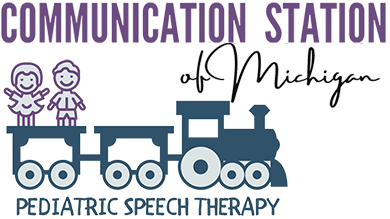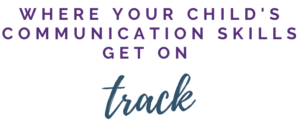Looking for Speech Therapy for Children in the West Bloomfield, MI area? Sara Lipson of The Communication Station of Michigan provides speech and language therapy to clients while working together with their families. Speech-Language Pathologist Sara Lipson creates unique, evidence-based programs to help children communicate clearly and effectively within a safe environment. From toddlers to adolescents, Sara helps all populations with a wide range of disorders including Autism Spectrum Disorder, developmental disabilities, and hearing impairment.
Through individualized assessments and plans, Sara is committed to helping our clients improve their speech and language skills in areas of: receptive/expressive language, articulation/phonology, pragmatics, apraxia, fluency, hearing impairment, and cognitive deficits among other developmental/acquired speech and language disorders.
The Importance of Speech Therapy
It is crucial that a child who is limited with communication receive ongoing speech and language therapy so that they can learn to communicate their daily and basic needs and wants to others in their environment. The following tips will help reach out to people who are unclear why a child might need speech and language therapy when they are unable to use speech for functional communication. When you can’t use speech for communication, you are very limited!
A child without a voice is limited in their ability to make choices, interact socially, communicate basic needs and wants and most importantly can be closed off from the world in many ways.
What are the Benefits of Speech Therapy for Children?
1. Helps with Communication
Providing those without a voice a way to communicate through unaided and/or aided communication (e.g. no tech communication books, low and mid tech communication devices, high tech communication devices and/or communication apps). Speech and language therapy is not just about speech; it also includes language. Many people have a misconception that speech therapy is just about the speech but it is so much more than that.
2. Helps with Social Skills
Appropriate pragmatic/social skills are a key component to interacting with others in their community and life. When you have limited, or have no functional speech, pragmatic language skills are often significantly delayed and disordered. Social skills can be targeted with the use of video modeling, role playing, specific therapy apps, social stories and other various strategies and tools. The use of aided communication with these strategies to work on improving these social skills is important.
3. Helps with Reading
Reading and literacy skills can significantly aid in communication. When you can spell, you can communicate freely. Teaching these essential skills can be the key to better communication with others.
4. Enhances Alternative Communication Methods
Work on other communication strategies to aid communication such as gestures, sign language, approximations, vocalizations, and/or other means of communication. As humans, we communicate with a total communication approach. We communicate via speech, facial expressions, gestures, eye contact, writing, typing and many other forms of communication.
Teaching on how to communicate in other ways in addition to a formal means of aided communication (e.g. use the sign for “bathroom”, “eat” and “drink”, tap on a person’s shoulder to get their attention, etc). Also, if a child has specific sounds that are being used consistently, make them meaningful. For example, if a child can say “ha,” use that for “help”. For the approximation, “ba” you might use that for “book” if that is important to that specific individual.
5. Reduces Communication Frustrations
Speech therapy helps children improve communication skills with other children and adults. It focuses on improving speech muscles through special exercises. Speech exercises involve repeating sounds and imitating the speech therapist.
What does a speech therapy session look like?
Children often are treated one on one or in small groups. Language activities often involve using picture books, talking and playing, and using repetition to build language skills. Sound exercises are an important part of speech therapy. The therapist often goes over letter sounds and words. The therapist shows the child how to say the word or make the sound. They may even demonstrate how to move the tongue when pronouncing certain words.
Speech therapy involves oral feeding and swallow therapy at times. The therapist might massage the face and perform tongue, lip, and jaw exercises to strengthen the jaw. They introduce food at different temperatures and textures to increase the child’s awareness of differences in sensation. This therapy is for children with swallowing difficulties.
Children are treated for different speech disorders, stuttering, problems pronouncing words, trouble with pitch, volume or quality of speech, and having a limited understanding of words and their meaning. Some children have problems putting words together or use language in an inappropriate way. Others have memory and attention disorders. Some children have problems swallowing, chewing, coughing and refusing food.
Why is speech therapy important?
Speech therapy is necessary to improve overall communication. Speech delay can cause problems listening, reading and writing, A speech therapist will look at a child’s ability to speak and understand others properly when working with them. They focus on language drills and group therapy to improve conversation drills.
Speech therapy has many benefits for children, including:
Improving communication so they will be able to express thoughts and feelings
+Enabling them to speak so that others will understand what they are saying
+Preparing them for school so that they can keep up with other children in learning
+Improves vocal quality
+Increases self-esteem and independence
Speech therapy is time-consuming and requires a commitment from parents. Often they have to work with the child at home for it to be successful. Overall, it takes time and often patience for speech to improve.

